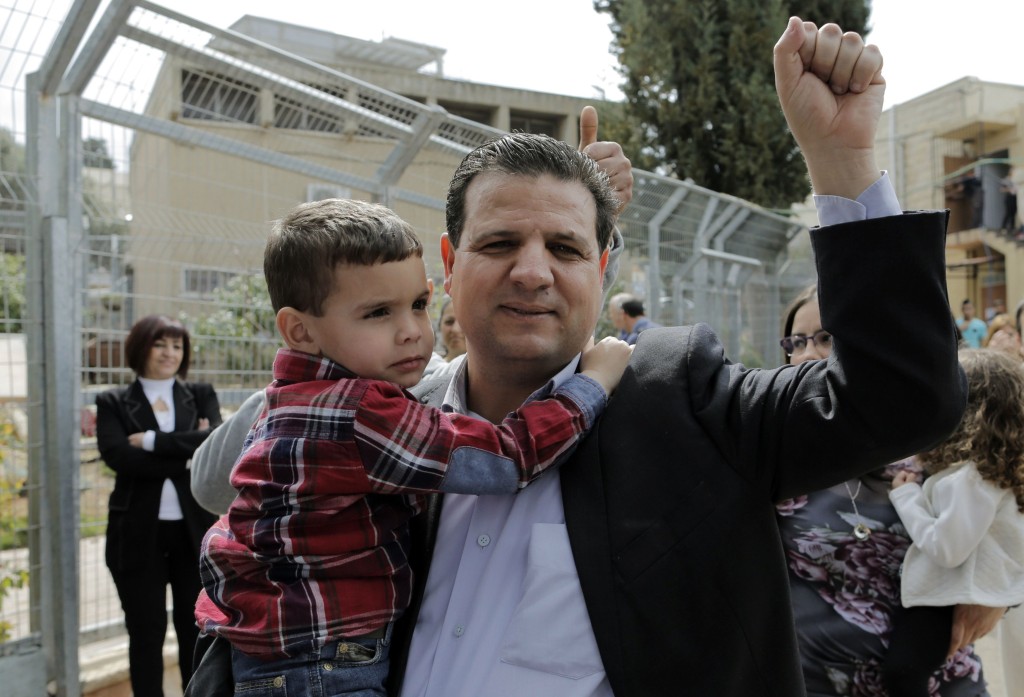The Joint List, a coalition of four political parties, set for 13 seats in Knesset

Ayman Odeh, head of the Joint Arab List, gestures as he holds his son outside a polling-station in the northern city of Haifa yesterday.
Although Prime Minister Benjamin Netanyahu confidently declared victory last night after Israel’s close-run national election appeared to give him the upper hand in forming the country’s next coalition government, there was an interesting undercurrent to the vote — the party that finished third.
A united bloc of Arab politicians, known as the Joint List or Arab Joint List, must have been torn between celebrations and commiserations as exit polls hit the Israeli media.
The Joint List performed strongly, representing the substantial number of Arab voters in Israel, but still they may have failed in their main aim — preventing Netanyahu from forming the nation’s next government.
Some 20 percent of Israel’s 5,881,696 eligible voters are believed to be Palestinian, also referred to as Israeli-Arabs. For many years, Israeli-Arab parties have been divided by all sorts of political differences, whether political or religious.
But new legislation pushed through by the current government, which raised the threshold of votes needed to win seats in the Knesset (the Israeli Parliament), threatened those parties’ ability to represent voters and even to be represented.
Some 20 percent of Israel’s 5,881,696 eligible voters are believed to be Palestinian, also referred to as Israeli-Arabs.
Some analysts saw that move as a bit to limit the influence of the Israeli-Arab vote. But as a consequence, they decided to unite as an Arab bloc. Despite past Palestinian voter apathy, with many feeling Israel’s policies toward the Palestinians would never change, and even previous boycotts of elections, the Joint List, made up of four factions, seems to have motivated voters this time out — exit polls yesterday predicted the bloc could take as many as 13 seats when official results are made available next week, placing them a strong third.
According to reporters on the ground on election day, there were signs of increased Israeli-Arab voter turnout, with reports of long queues outside polling-stations in predominantly Arab areas.
Arab Joint List leader Ayman Odeh said yesterday that Israel had reached a “historic moment,” with this result. Speaking at the party’s post-election event, he said the Joint List had “the highest Arab voting rates since 1999.”
“We will block Netanyahu from forming the government,” he added.
Joint List candidate Ahmad Tibi told Israeli newspaper Haaretz that while the general vote result was “disappointing,” his bloc had “won the support of the public,” which had said “nyet” to the anti-Palestinian rhetoric of controversial Foreign Minister Avigdor Lieberman and his far-right Yisrael Beytenu party.
Some in Israel believe it was Lieberman who pushed for raising the electoral threshold. Most exit polls predicted his party would finish ninth, with five seats in the 120-seat Knesset.
No partnering
Prior to the vote, the Joint List ruled out signing up to any government led by Isaac Herzog of the Zionist Union, and the bloc repeatedly declared it would never consider governing with Netanyahu.
But Arab politicians could play an important role in supporting any move by Herzog to form a coalition, even if they remain in the official opposition. Supporting a move by the Zionist Union to form a government would be a powerful step.
A lot will depend on who is invited by President Reuven Rivlin to have the first chance to form a coalition. Most analysts, albeit basing their opinions on early exit polls, believe that is likely to Netanyahu, who may find it easier to align his Likud Party with other right-wing groups.
The Israeli PM was clearly worried before exit polls began to emerge.
While voters headed to the polls, Netanyahu made a statement on Facebook, calling on Likud supporters to cast their ballots, repeating earlier accusations that “foreign funds” were helping “leftist groups” to perform well in the election.
He then made statements which were criticized by the US government and others for targeting communities.
“The right-wing government is in danger,” Netanyahu wrote. “Arab voters are going to vote in droves. Left-wing NGOs are bringing them in buses.”
The Israeli PM said that there was nothing wrong with Jewish and Arab citizens voting as they wish, but he referred to the Joint List as the “extremist Arab list.”
“The right-wing government is in danger,” Netanyahu wrote. “Arab voters are going to vote in droves. Left-wing NGOs are bringing them in buses.”
Joint List candidate and MK Dov Khenin complained to Israel’s Central Elections Committee about the comments later, telling Israeli media that “a prime minister who campaigns against voting by citizens belonging to an ethnic minority is crossing a red line of incitement and racism.”
“This is especially severe on Election Day, when the message to Israeli citizens is to participate in the elections, vote, and take part in the democratic system,” he added.
Although official results won’t be confirmed until next week and the political differences between the four parties of the Joint List are vast (Odeh heads the bloc’s largest member, Hadash, a far-left Communist grouping), it’s clear that Israeli-Arabs are now an influential part of the country’s “democratic system” — and in larger numbers than ever before.
@urlgoeshere
Originally published in the Buenos Aires Herald, on Wednesday, March 18, 2015.
Link: http://www.buenosairesherald.com/article/184627/arab-bloc-soars-to-third-in-israel-vote.
